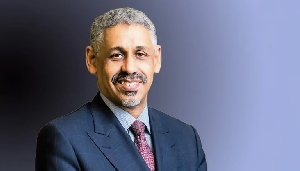- Home - News
- Elections 2024
- News Archive
- Crime & Punishment
- Politics
- Regional
- Editorial
- Health
- Ghanaians Abroad
- Tabloid
- Africa
- Religion
- Photo Archives
- Press Release
General News of Thursday, 29 May 2025
Source: www.ghanawebbers.com
The Tah Doctrine: A Presidential Mandate for Africa’s Next Chapter
Dr. Sidi Ould Tah was elected as the 9th President of the African Development Bank (AfDB) today. He received 73% support from Regional Member Countries and 77% overall. This double mandate is unprecedented in the Bank’s history.
The AfDB has struggled between caution and vision for years. Now, it needs a catalytic presidency with a clear doctrine.
Dr. Tah will officially take office in September 2025. Africa and its partners are already noticing his direction. This leadership transition signals the emergence of a new doctrine focused on execution rather than ideology.
At BADEA, where he served for over ten years, Dr. Tah achieved significant results. Annual approvals rose twelvefold, while disbursements increased eightfold. BADEA became influential in infrastructure, SME finance, and digital platforms. He also secured a 376% capital expansion and launched a ten-year strategy.
In May 2025, just before his AfDB election, S&P Global upgraded BADEA’s credit rating to AA+. This achievement speaks louder than any slogan.
From this success comes The Tah Doctrine—anchored on five pillars: Execution, Scale, Innovation, Inclusion, and Institutional Fitness. It emphasizes that Africa cannot thrive without efficient institutions suited for today's global challenges.
This doctrine is timely as global financing becomes more selective. Development aid is narrowing while Africa's population grows rapidly. Cities are expanding, increasing demand for infrastructure and energy.
The AfDB must evolve into a broker of capital and policy coherence. Currently, its annual lending of around $10 billion falls short of Africa's $100 billion+ development financing gap.
Under The Tah Doctrine, scale is essential for success. Expect bold efforts to expand capital through various reforms and blended finance vehicles that attract private investment.
The Africa Investment Forum (AIF) may be reimagined as a year-round syndication platform for investors rather than just an annual showcase.
However, scale alone won't suffice without execution. Dr. Tah brings a delivery mindset focused on results at AfDB—moving beyond feasibility studies to tangible outcomes in education and agriculture.
This presidency aims to change futures through approved funds effectively used.
On innovation, Dr. Tah supported advanced financial tools at BADEA like programmable Islamic finance and AI-enabled agri-tools. At AfDB, expect similar innovations such as trade finance systems and regional digital infrastructure to help producers meet compliance standards.
If previous frameworks emphasized liberalization and fiscal discipline, The Tah Doctrine focuses on building capable institutions that empower African agency in development tools tailored to local contexts.
Crucially, this doctrine embodies African values rooted in Ubuntu: "I am because we are." Development should be co-created collectively rather than imposed externally.
The doctrine channels this ethic into institutional form by asserting that African ambition must not be outsourced or postponed any longer.
A revitalized Africa Investment Forum will likely curate pipelines year-round while mobilizing accountable capital—not just convening discussions but driving action forward.
Additionally, an Export Transition Facility could help firms adapt to new trade expectations like ESG benchmarks—these ideas are urgent realities today.
Regarding regional integration, the doctrine aligns trade financing with the goals of the African Continental Free Trade Area (AfCFTA). It emphasizes building real infrastructure like corridors and ports while activating supply chains led by private sectors.
Inclusion is also vital; women and youth are central to Africa's growth story—not sidelined but empowered as engines of productivity through targeted programs introduced by Dr. Tah at BADEA.
At AfDB expect gender-focused SME financing designed specifically for businesses led by youth today—a proactive approach treating demographic shifts as competitive advantages instead of crises.
No doctrine can escape the realities faced by mature institutions like AfDB; it does not rely solely on charisma or one individual’s vision but aims for lasting impact through structured leadership focused on delivery over disruption.
Ultimately The Tah Doctrine seeks renewal rather than rupture within existing systems.
Skeptics may arise; however precedent matters—BADEA transformed through performance rather than mere promises—and this legacy accompanies Dr. Tah to AfDB.
This doctrine sends a message: credible institutions backed by clarity can drive transformation across Africa.
It insists that bureaucracy should no longer delay progress nor should potential remain unfulfilled—it must be delivered collaboratively through effective partnerships worldwide.
This approach prioritizes strategy over sentiment—focusing on deliberate architecture that evolves responsibly.
Doctrines are judged not merely in theory but by their tangible impacts—in lives improved or jobs created—and ultimately what they build matters most.
Chinedu Moghalu is an expert in strategic communications with extensive experience across government organizations globally focusing on reform efforts spanning health education climate resilience among others holding degrees relevant fields including law political science communication development executive training Harvard Kennedy School University Maryland USA











